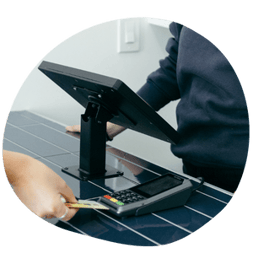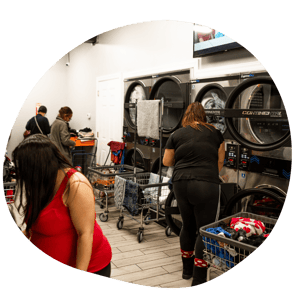Laundromats have been an unsung cornerstone in American culture since the 1930’s. More than just a stop for convenience, laundromats provide a basic and universal need for clean clothes. From busy professionals to families and students, they cater to a wide spectrum of people and socio-economic status. This neighborhood hub is a timeless option for those considering investing in laundromats.
The online on-demand laundry service market was worth 34.91 billion USD in 2023, and is predicted to grow to around 563.05 billion USD by 2032, suggesting laundromats are becoming a near-universal experience for Americans. In fact, another study showed that North America accounts for by far the greatest share of global laundry revenue at over 37.3% in 2024. Laundromats have been quite literally woven into American culture for nearly 100 years, and considered a “recession-proof” industry. Now, it’s reinventing itself, ripe with new investment opportunities.
Is a laundromat worth the investment?

As people’s lives get busier, convenience will grow in importance, leading to a greater need for professional laundry services. The pie is getting bigger and waiting for savvy investors to grab their slice.
Sure, laundromats are a great investment option for entrepreneurs who want to break into a recession-proof industry with 20-30% profit margins and passive income opportunities; but it’s also an opportunity to join a historical mission to make the lives of Americans easier and keep clean clothes on the backs of millions. The revenue benefits are hardly the only draw to get excited about.
Like any business venture, breaking into the laundromat industry has its share of pros and cons, opportunities and challenges. It's not just about counting coins but understanding market trends, customer preferences, and the ever-evolving world of laundry tech. Owning a laundromat has its benefits, common challenges, and return on investment expectations, which we’ll talk about more in this blog.
Before you buy a laundromat, it’s important to conduct proper due diligence. This checklist will guide you through it to save you money.
Why investing in laundromats is a smart choice
Unless you’re an experienced investor, it can be a daunting task to determine what’s worthwhile. Among the many available ventures, investing in laundromats is a unique and promising prospect. If you're intrigued by a business that marries the daily needs of a community with consistent revenue, then opening a laundromat might be the ticket.
1. Financial stability and growth potential
Laundromats are like that reliable old friend who's always got your back. They’ve been steadily generating income for decades and you can count on clothes always getting dirty. This means a consistent customer base with a recurring need.
Amidst economic instability, recession-proof investments are top of mind. Laundry neatly fits into this category and history stands as proof. The American laundry service industry was wrought in the Great Depression. Fast forward to recent history: COVID-19 left adjacent consumer services to wither while the national laundry industry boasted room to grow. According to the U.S. Bureau of Labor Statistics (BLS), the number of coin-operated establishments went from 9,548 in the first quarter of 2020, to 10,026 in the first quarter of 2024.
2. Attractive demand trends in laundry
The laundry industry has reworked itself to meet the needs of today’s on-the-go lifestyle. Gone are the days of wash, rinse, repeat to make way for specialized services like eco-friendly washing, quick-service models, and even laundry subscriptions. That’s right—laundry has joined the ranks of household favorites like Netflix. And it’s no surprise! An IBISWorld report found that most individuals in urban areas live in apartments with very limited square footage that can’t accommodate laundry machines. Instead, in highly populated urban areas, consumers are turning to laundromats. With increasing urban populations nationwide, the potential of this industry is projected to grow.
3. More payment gateways
When you picture a laundromat, you probably imagine the sound of coins clinking, but that’s not the whole story today. Card systems, digital payments, and even app-based models are turning laundromats into tech-forward storefronts.
Pittsburgh-based Steve Burk picked up on this when planning to invest in his own laundromat, The Laundry Bin. After some in-depth market research, Burk realized that the local laundromats were stuck in the past, with many still offering only a coin payment option. Burk resolved to open a laundromat offering a card-payment system, in turn providing a more convenient option for patrons.
4. Opportunities for innovation
The laundry industry is a wonderland of opportunity… But are laundromats a good investment? There are seemingly countless convenient services you can add to your business to attract new customers, bring in more revenue, and increase your margins. If you consider yourself creative, the laundry industry could be your canvas.
For example, commercial customers are a huge niche of opportunity that provides laundromat owners with a consistent cadence of high revenue. Take Amy Martinez-Monfort’s Tampa Laundry Company for example. In order to start taking on commercial clients she proactively reached out to gyms, restaurants, health centers, and neighboring small businesses. By addressing the clients’ pain points—like the tedium of in-house laundry operations—she was able to extend the value they needed from laundry services.
Another area of innovation is hybrid models like Gainesville, Florida’s Fresh Laundry & Café. Maritza Padgett, the entrepreneurial spirit behind this laundromat café, merged a community necessity with her longtime dream of owning a café. Faced with the challenge of running not one, but two successful businesses, Padgett researched technology solutions that could automate some of the mundane, time-sucking tasks that go into running her business. She implemented Cents’ solutions into her operations and never looked back. “Cents has integrated an inventory system, allowing me to separate my cafe items from my wash-and-fold ones,” she said. “Now, I can track my finances day-to-day for the café separately from my wash-and-fold customers.” The result has been countless stellar Google reviews, an increased average order value (AOV), and a majority of repeat customers. She has even been able to expand her service offerings to include pickup and delivery.
5. Positive comparisons to other investments
While stocks have their highs and lows and real estate comes with its share of commitments, laundromats offer a unique blend of steady returns and flexibility. They're like that middle ground between a savings account and opening a restaurant—you get the community vibe and thick margins with less hands-on responsibility and risk.
What is a laundromat ROI?
Navigating the maze of investment opportunities can sometimes feel like deciphering a foreign language. Luckily, the story becomes clearer once you break down the numbers.
Initial investment costs and ongoing operational expenses
Initial investment costs vary, but these are the ranges we usually see:
Lease for Location: Depending on the city and the size of the facility, this can range from $1,500 to $5,000 per month or more. High-traffic areas in cities or near apartment complexes are ideal but come with a bigger price tag. Lease costs can vary widely based on size and locality, so research is your friend.
Equipment: The heart and soul of your laundromat are your machines! Commercial washers and dryers don’t come cheap, with a range from $500 to $20,000 per unit, depending on capacity and brand. For a moderate-sized laundromat with 20 washers and 20 dryers, you could be looking at an equipment cost of $40,000 to $800,000. Investing in energy-efficient and durable machines can save you money in the long run.
Initial Inventory and Supplies: This includes detergents, change machines, carts, etc., and can cost around $5,000 to $10,000.
Utilities Setup: Initial utility deposits and setup may cost $1,000 to $5,000. This is very dependent on your location and cost of utilities in the area.
Renovation and Interior Setup: Depending on the existing condition of the leased space, this could be $10,000 to $50,000.
Business Licenses and Permits: $500 to $2,000, depending on the jurisdiction.
Insurance: $2,000 to $6,000 per year, depending on your equipment, insurer, area, and other variables.
Miscellaneous Costs: Include contingency funds, initial marketing budget, and professional service fees, possibly around $5,000 to $15,000.
Ongoing Operational Expenses: Think utilities, detergent supplies, maintenance, and possibly staff wages if you're not manning the fort yourself. Also, keep in mind the occasional equipment upgrade or maintenance costs.
Adding these up, you're looking at a rough initial investment range of $65,000 to $940,000 for a moderate-sized laundromat. Ongoing operational expenses can also vary but may range from $10,000 to $30,000 per month, depending on factors like utilities, labor, and lease.
ROI expectations and profit margins
The average laundromat can expect an ROI of around 20-30%, depending on factors like location, competition, and the services offered. Offering ancillary services like dry cleaning, wash and fold, pickup and delivery, sneaker cleaning, and other luxury services can boost these numbers.
Investments fit for different budgets
Laundromats are versatile. If you're on a tighter budget, consider a smaller set-up in a modest location or even purchasing a pre-existing laundromat that might just need a little TLC. For those with deeper pockets, thinking about a more upscale, amenity-rich laundromat in a prime location might be appealing. There are many unique laundromat ideas to consider when crafting your business plan. Maybe even add a café, micro-library, arcade, or mini stage for local performers to attract new self-service customers.
Financial tools and resources for laundromat investors
Starting a business requires solid financial planning. Fortunately, there are specific tools tailored for the laundromat sector. Industry associations like Coin Laundry Association offer guidance, and there are specialized software that can help you project earnings, track expenses, and optimize pricing. Also, don’t overlook the power of a knowledgeable accountant, especially one familiar with the laundry business.
Potential risks and challenges
Embarking on a laundromat venture is promising, yet like any investment, it's not without its risks. This is why it’s crucial to make yourself aware of the potential challenges that lie ahead. Here are some of the most important considerations a laundromat investor should be familiar with.
Finding a good deal
Finding the perfect laundromat opportunity can be like searching for a needle in a haystack. While there are plenty of listings out there, not all are golden tickets. Some might be priced too high for their value, while others might come with hidden issues like outdated equipment or pending lease terminations. The key is rigorous research, placing an emphasis on factors like location, market fit, equipment quality, and lease terms. By thoroughly evaluating these elements, you're more likely to land a deal that truly meets your investment goals.
Industry considerations
While the demand for laundry is perennial, there are industry-specific threats to be wary of. The rise of in-home laundry appliances in certain markets, for example, can dampen the foot traffic to your establishment. You also need to consider local competition. With low entry barriers, it's not uncommon to see multiple laundromats pop up in close proximity. Plus, let’s not forget the looming environmental regulations that might necessitate the adoption of eco-friendly equipment or practices, sometimes at a significant cost.
Maintenance considerations
Machines require regular maintenance to function optimally. This not only includes routine check-ups but also addressing unexpected breakdowns. On top of that, keeping the laundromat clean and ensuring all amenities -such as change machines or waiting areas- are in top shape can be demanding. A malfunctioning machine isn’t just a temporary loss of income; it can also dent your establishment’s reputation.
Working schedule and operator demands
Laundromats often have extended hours, catering to folks who want to do their laundry after work or during weekends. This means being available, either in person or ensuring staff presence, for longer periods. It also means addressing operational hiccups that might arise outside the conventional working hours. Moreover, peak seasons like college move-ins in a university town can demand extra attention.
Common questions laundromat investors ask
One of the best ways to become a good laundromat investor is to befriend others in your area, or online. To help get familiar with questions you may ask, we’ve compiled a list of answers from seasoned laundromat operators.

Are laundromats a good side hustle?
Absolutely! With the potential for passive income, many investors consider laundromats an excellent side hustle, provided they've set up efficient operational processes.
What are the risks of a laundromat business?
Initial costs can vary, particularly with equipment and location choices. Operational expenses encompass utilities, maintenance, and possibly staffing. Efficiency in operations can manage these costs.
What is the future of laundromats?
The industry is ripe for innovation, with opportunities in tech integration, eco-friendly operations, and diversified service offerings.
Is owning a laundromat passive income?
It can be, especially if you have a reliable team and automated systems in place. However, some hands-on management is often required, especially in the initial stages.
Do laundromats do well in a recession?
Historically, laundromats have been resilient during economic downturns, as washing clothes remains a necessity.
What is the ROI potential for a laundromat investment?
ROI typically ranges between 20-30% annually, though this can vary based on factors like location, services, and management efficiency.
Why choose laundromats over other investment opportunities?
Laundromats offer a blend of steady returns, potential for passive income, and resilience against economic downturns, making them stand out against other investment options.
What are the common risks associated with laundromat investments?
Main risks include equipment breakdowns, increased competition, fluctuating utility costs, and staying updated with industry trends.
How do successful investors overcome challenges in the laundromat business?
Through diligent research, proactive maintenance, diversifying services, and staying engaged with the customer base to anticipate and meet their needs.
Can laundromats provide a steady passive income?
Yes, with the right systems and processes in place, laundromats can provide a consistent stream of passive income. However, periodic involvement to oversee operations and address challenges is advisable.
Should you invest in a laundromat?

Laundromats offer a unique blend of consistent demand and potential for innovation culminating in a great investment opportunity. With a historically stable ROI, attractive profit margins, and versatility in operation models, a laundromat can be a smart investment decision if done correctly. However, like any business, they come with their challenges—from ensuring regular maintenance to staying ahead of industry threats.
It's essential to balance enthusiasm with due diligence. Engaging with industry experts, leveraging specialized financial tools, and staying ahead of market trends will arm you with the information you need to be successful in this industry. Knowledge isn't just power; it's the foundation of a profitable investment.
To continue your laundromat investment journey, discover the Operator's Guide to Laundromat Ownership. Happy investing!
Before you buy a laundromat, it’s important to conduct proper due diligence. This checklist will guide you through it to save you money.
.png?width=2196&height=2196&name=OS%20(1).png)

-3.png?width=224&height=213&name=Accelerate%20(2)-3.png)




![Is a Laundromat a Good Investment? [Complete Investor's Analysis]](https://www.trycents.com/hs-fs/hubfs/doing-laundry-in-nyc-laundromat-header.jpg?width=960&name=doing-laundry-in-nyc-laundromat-header.jpg)








